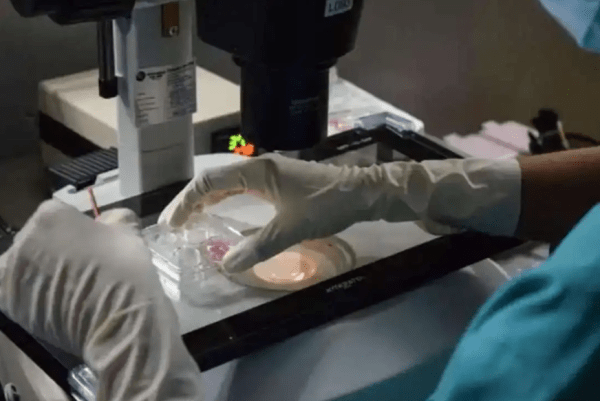Singapore must encourage motherhood within marriage
May 26, 2023 · By Dr Alexis Heng Boon Chin for www.ucanews.com

A staff member shows a mock-up of work being done on women’s eggs in the laboratory at the KL Fertility Centre in Kuala Lumpur, Malaysia. (Photo: AFP/ UCAN files)
Singapore must encourage motherhood within marriage
Recently, the Singapore government extended age limit restrictions on elective egg freezing from 35 to 37 years of age, based on the latest scientific and medical data that showed reasonably acceptable clinical outcomes for egg freezing at this age limit.
For older women above 37 years of age, there are much-reduced chances of future reproductive success and low cost-effectiveness with egg freezing. Nevertheless, it is anticipated that many older women above this age limit will still want to undergo egg freezing overseas.
This may represent lucrative business opportunities for local IVF clinics in Singapore, because of a loophole in healthcare regulations that do not stop local fertility doctors from aiding and abetting patients to do egg freezing overseas.
Because egg freezing is a rather lengthy and tedious process lasting a few weeks, it would be advantageous for older women with busy work schedules to start the initial part of the process at a local IVF clinic in Singapore, before traveling overseas to freeze their eggs at a collaborating foreign clinic.
Clinical procedures that can be done locally include preliminary health checks and screening of ovarian reserves, as well as hormone injections to stimulate egg production within their ovaries. The time that they will need to spend overseas will thus be reduced to only the final part of the egg-freezing process, which includes outpatient surgery for egg collection and freezing, thus causing minimal disruption to their busy work schedule.
The question that arises is whether there is a breach of medical ethics and professional code of conduct for local IVF clinics and doctors in this case.
“It is mandated that only legally married women can use their frozen eggs for IVF treatment at local fertility clinics”
This is because they already know full well that older women above 37 years old have much-reduced chances of future reproductive success with egg freezing, which is why the Singapore government imposed such restrictions in the first place. Yet they still want to take the opportunity to earn additional medical fees with such older women.
Hence to maintain legal and ethical consistency in the implementation of local healthcare regulations that restrict egg freezing to women at or below 37 years of age, Singapore should ban local IVF clinics from aiding and facilitating overseas egg freezing for older women above this age limit.
Currently, in Singapore, it is mandated that only legally married women can use their frozen eggs for IVF treatment at local fertility clinics. For some single women who are unable to find their Mr. Right and want to pursue the option of single motherhood with their frozen eggs, they can exploit yet another loophole in local healthcare regulations. That is the absence of laws that would stop women from exporting their frozen eggs overseas to foreign fertility clinics, in order to do treatment procedures banned in Singapore. In particular, surrogacy and IVF treatment of unmarried women with donated sperm.
At present, single motherhood with donor sperm is a highly controversial issue in socially-conservative Singapore. It is generally viewed with greater disapproval than an accidental pregnancy outside marriage because it is seen as premeditated, deliberate and willful, intentionally depriving a child of having a father.
From the conservative viewpoint, children of divorced single mothers or those born out of wedlock usually know the identity of their biological fathers, and often receive financial support and have contact with them. By contrast, the identity of the biological father of a donor-conceived child and the role that he plays in the child’s life is often a complete blank. Hence, it is often questioned whether this is in the child’s best interest.
Overseas surrogacy is also a highly contentious issue in Singapore, commonly perceived as exploiting economically-disadvantaged women from poorer countries, and a form of human trafficking.
Hence, for legal and ethical consistency, the Singapore government should take steps to plug such loopholes, in line with their official policy of using egg freezing to encourage motherhood within the context of marriage and traditional family structure.
Dr. Alexis Heng Boon Chin, an expert in Biomedical Science, had previously worked in the field of human clinically assisted reproduction research in Singapore and has authored 50 international journal publications on ethical and legal issues relating to new reproductive technologies. The article expresses his personal opinion, which is not connected to any institutions that he is affiliated with. The views expressed in this article are those of the author and do not necessarily reflect the official editorial position of UCA News.






